Courage to forge new partnerships, foresight to deepen current ones crucial for ASEAN amid rising protectionism: Anwar
ASEAN is deepening economic linkages, widening trade and enhancing competitiveness, the Malaysia Prime Minister and ASEAN chair said at the opening of the twice-yearly leaders’ summit where he welcomed Timor-Leste’s admission to the “family”.
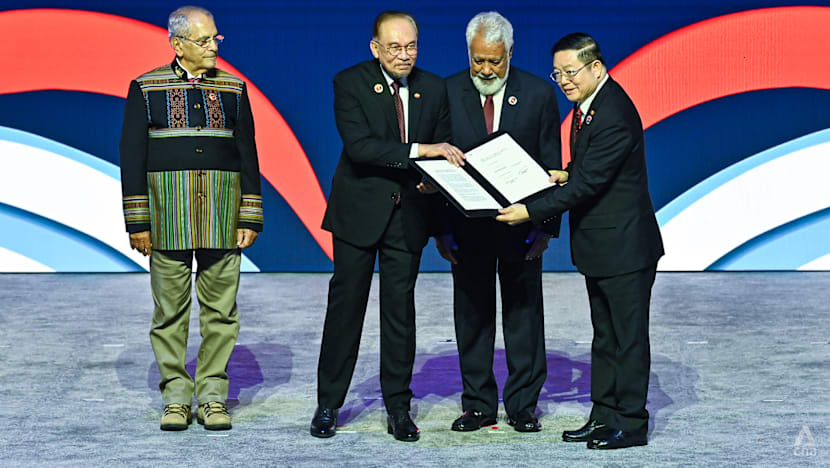
(From left) Timor-Leste President Jose Ramos-Horta looks on as Malaysia's Prime Minister Anwar Ibrahim, Timor-Leste Prime Minister Xanana Gusmao and ASEAN Secretary-General Kao Kim Hourn hold the signed declaration of Timor-Leste's admission to the Association of Southeast Asian Nations (ASEAN) during the ASEAN Summit in Kuala Lumpur on Oct 26, 2025. (Photo: CNA/Zamzahuri Abas)

This audio is generated by an AI tool.
KUALA LUMPUR: The Association of Southeast Nations (ASEAN) must have the courage to forge new partnerships and deepen existing ones amid rising protectionism and shifting supply chains, said the bloc’s chairman Anwar Ibrahim on Sunday (Oct 26) as it admitted Timor-Leste as its 11th member.
The relative peace and prosperity that ASEAN has enjoyed for nearly six decades are not self-sustaining, said Malaysia Prime Minister Anwar as the three-day ASEAN Summit and related meetings opened.
“They must be renewed through cooperation and strengthened by shared purpose. That is why ASEAN is deepening economic linkages, widening trade, and enhancing competitiveness,” he said.
Analysts have billed this year’s ASEAN Summit and related meetings as one of the most significant in years due to high-profile attendees as well as ongoing geopolitical and economic tensions, especially between the United States and China.
Besides Southeast Asian leaders, attendees include United States President Donald Trump, who arrived and was welcomed by Anwar at the airport on Sunday morning, Chinese Premier Li Qiang, new Japanese Prime Minister Sanae Takaichi, South African President Cyril Ramaphosa and Brazilian President Luiz Inácio Lula da Silva.
“2025 is a year that asks more of us. The world feels unsettled – the old order no longer certain, the new one not yet defined,” said Anwar.
“Across regions, we see rising contestation and growing uncertainty. These crosswinds test not only our economies, but our collective resolve to keep faith in cooperation – to believe that understanding and dialogue can still prevail in a divided age.”
ASEAN NOT STANDING STILL AMID RISING PROTECTIONISM
Citing examples of how ASEAN has been forging new partnerships and deepening existing ones, Anwar pointed to Malaysia’s hosting of the 2nd ASEAN-Gulf Cooperation Council (GCC) and the ASEAN-GCC-China Summits earlier this year.
The 5th Regional Comprehensive Economic Partnership (RCEP) Leaders’ Summit, convening on Monday, will also advance the world’s largest free-trade area “toward its full potential”, Anwar said.
He also cited the upgraded ASEAN Trade in Goods Agreement (ATIGA), launched at the summit, with the aim of creating a more seamless regional market for businesses and workers.
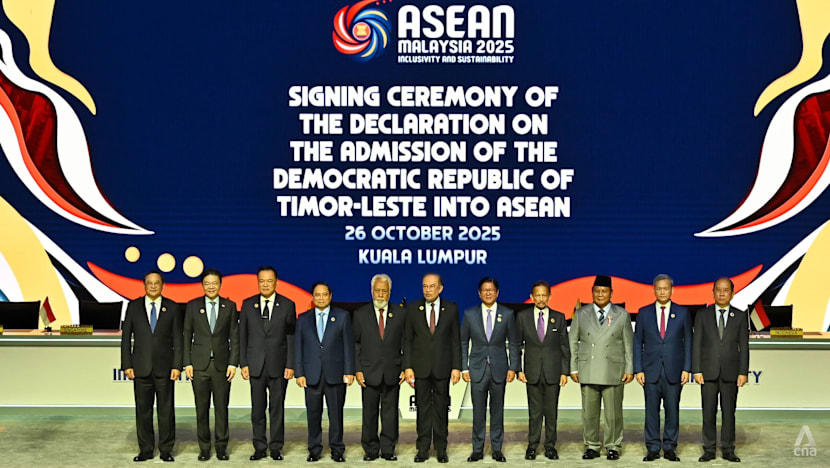
ATIGA is aimed at achieving a free flow of goods between ASEAN member states, resulting in lower business costs, increased trade, and a larger market and economies of scale for businesses.
The upgraded agreement targets the further lowering of tariffs and the removal of non-tariff barriers among member countries.
As of 2020, ATIGA had eliminated tariffs on 98.6 per cent of products traded within ASEAN.
Last Friday (Oct 24), Malaysia’s Investment, Trade and Industry Minister Tengku Zafrul Abdul Aziz said the upgraded agreement would boost intra-ASEAN trade.
Intra-ASEAN trade made up 22.3 per cent of ASEAN’s total goods traded in 2022. “There is room for improvement,” he told journalists. “We hope that with this upgrade, it can go even higher.”
Singapore Deputy Prime Minister Gan Kim Yong called it “one of the most important economic agreements among ASEAN countries”.
ASEAN economic ministers had concluded negotiations to upgrade the ATIGA in May.
On Sunday, Anwar said the bloc is advancing the ASEAN Power Grid with a new financing facility that will help bridge funding gaps and accelerate the transition towards cleaner, more secure energy.
It has also agreed to fast-track the ASEAN Digital Economic Framework Agreement by 2026.
“And to ensure technology remains our servant, not our master, we will establish the ASEAN AI Safety Network – AI SAFE – to embed ethics, safety, and sound governance in the use of artificial intelligence,” Anwar said.
ASEAN FAMILY NOW COMPLETE
Timor-Leste’s “historic” admission “completes the ASEAN family – reaffirming our shared destiny and deep sense of regional kinship,” he said.
“Within this community, Timor-Leste’s development and its strategic autonomy will find firm and lasting support,” Anwar added.
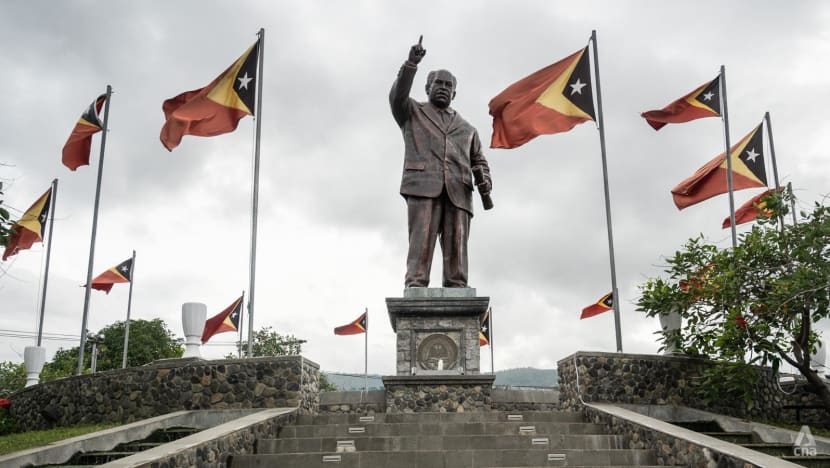
Timor-Leste Prime Minister Xanana Gusmao also spoke after the signing of the declaration of its accession to the regional grouping. Timor-Leste, a country of 1.4 million people, gained independence from Indonesia in 2002 after 24 years of occupation and applied to join ASEAN in 2011.
“Today history is made,” Gusmao said. “For the people of Timor-Leste, this is not only a dream realised, but a powerful affirmation of our journey - one marked by resilience, determination, and hope.”
ASEAN membership brings immense opportunities in trade, investment, education, and the digital economy, he added. ASEAN is the fifth-largest economy in the world with a total gross domestic product of US$3.6 trillion in 2022.
“We are ready to learn, to innovate, and to uphold good governance, strengthening our institutions as we walk together toward sustainable development,” said Gusmao.
Anwar stressed the importance of respect and reason among ASEAN members, as he cited the recent Thailand-Cambodia border dispute.
Tensions between the two neighbours erupted in July into the deadliest military clashes in decades, killing more than 40 people and forcing around 300,000 to flee their homes.
The two sides agreed to a ceasefire in late July - brokered in part by Trump - after five days of fighting and have since repeatedly traded accusations of truce violations.
Cambodia and Thailand signed their peace agreement on Sunday, witnessed by Anwar and Trump.
“Our strength lies not in uniformity, but in the conviction that respect and reason still bind us together,” said Anwar.
The Cambodia-Thailand peace agreement "reminds us that reconciliation is not a concession, but an act of courage – and that peace, once chosen, can reshape the future of nations", he said.
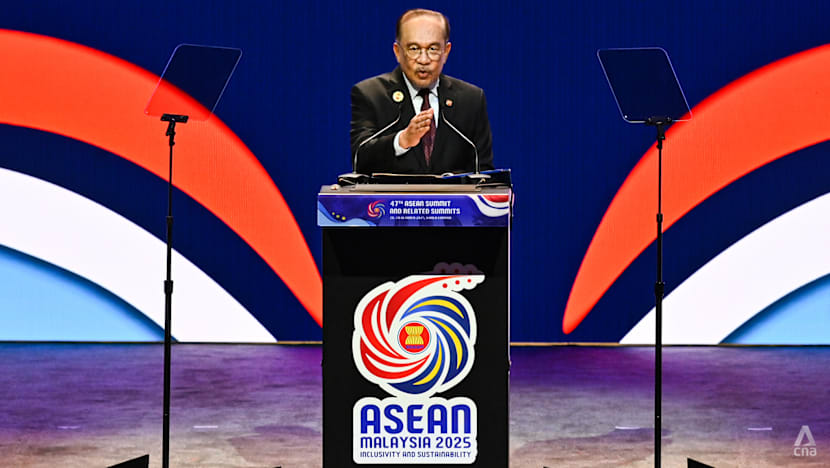
BUILDING BRIDGES WITH THE WORLD
At the ASEAN Summit plenary session, Indonesian President Prabowo Subianto said a strong ASEAN foundation “at home” would enable it to build bridges to the world.
“This foundation gives us the credibility to engage and help shape the future beyond our borders," said Prabowo, who echoed Anwar’s call for deeper economic coordination, integration and transformation.
"In facing global uncertainty, let us lead with purpose. Not just for our region, but for a more stable, just, and inclusive world," he said.
Filipino President Ferdinand Marcos Jr said the Philippines was ready to assume ASEAN chairmanship next year, with a focus on advancing practical, inclusive, and measurable initiatives that directly benefit people in the region.
Marcos emphasised the importance of the bloc’s centrality in strengthening peace, stability and collaboration in the Indo-Pacific region, said Claire Castro, Undersecretary of the Presidential Communications Office of the Philippines.
Marcos also highlighted the need for mutual benefit and broader dialogue, Castro said. He reaffirmed the Philippines’ commitment to the United Nations Convention on the Law of the Sea (UNCLOS) and the Agreement on the Conservation and Sustainable Use of Marine Biological Diversity of Areas Beyond National Jurisdiction (BBNJ Agreement).
UNCLOS, is the international agreement that defines a country's maritime zones, such as its territorial sea and exclusive economic zone, while setting rules for the peaceful use of oceans, management of resources, and allocation of rights.
The BBNJ Agreement establishes a global framework to protect marine life and manage human activity across the two-thirds of the world's oceans that lie beyond the national jurisdiction of any single country.
Attending the plenary session as guests of the ASEAN chair were Canadian Prime Minister Mark Carney, President of the European Council António Costa and International Monetary Fund (IMF) managing director Kristalina Georgieva.
Costa said regions should be linked not just through trade, but also through deeper ties in areas like digital infrastructure, energy and the green transition.
The European Union was ASEAN’s third-largest trading partner and its third-largest investor, he said.
The EU last month signed a free trade agreement with Indonesia called the Indonesia-EU Comprehensive Economic Partnership Agreement (IEU-CEPA), its third such agreement with an ASEAN member after Singapore and Vietnam, Costa said.
Negotiations with Thailand, the Philippines and Malaysia were progressing well, he said.
“Our collective ambition is clear: To work side by side to keep our regions even more connected to each other and to the world. Every new trade agreement and new investment is a bridge that reinforces stability and shared prosperity,” he said.
At the ASEAN-Japan Summit, Japanese Prime Minister Sanae Takaichi, on her first overseas trip since taking office, said her country advocates a free and open Indo-Pacific.
On the relationship between Japan and ASEAN, she said both sides are “trusted partners with heart-to-heart connections and through cooperation in a wide range of areas”.
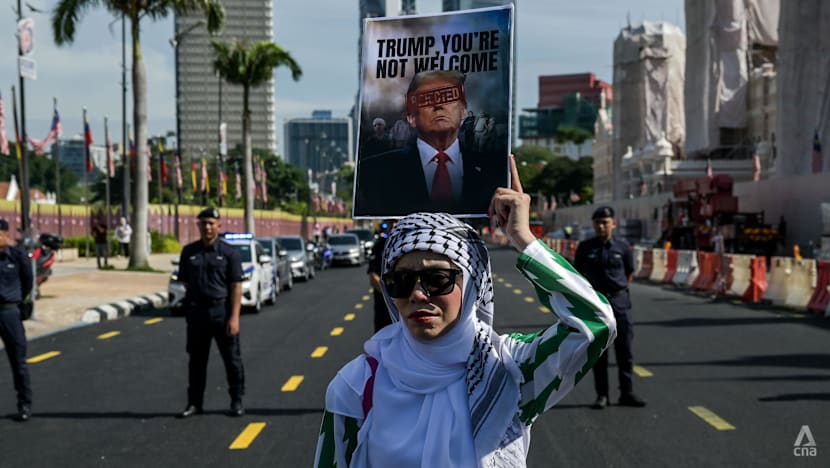
Separately, the issue of Myanmar’s domestic turmoil and the conflict between Thailand and Cambodia were discussed during the closed-door retreat among ASEAN leaders on Sunday night.
Myanmar has been in crisis since the military seized power in a coup in early 2021 against the elected government of Aung San Suu Kyi.
Prabowo urged the bloc to ensure that the principles of democracy and transparency are upheld in Myanmar, suggesting that ASEAN consider sending a team of observers to help ensure accountability in the country’s upcoming elections in December.
"The crisis around us continues to test our resolve, in our region, and among our friends. The situation in Myanmar remains a deep concern. We are observing the latest developments, including the plans for the elections in December 2025," said Prabowo in remarks that were posted on the Indonesian president’s website.
Myanmar’s junta had previously said that Malaysia would send observation teams to its long-delayed election.
In a joint statement released late on Sunday, ASEAN leaders voiced deep concern over the escalating conflicts and the grave humanitarian crisis in Myanmar, lamenting the slow pace of substantive progress on the Five-Point Consensus (5PC) implementation.
The 5PC is an ASEAN-led peace plan for Myanmar, which includes an immediate cessation of violence, constructive dialogue, humanitarian aid, a special envoy to facilitate a mediation process, and a visit by an ASEAN envoy to the country.
“We denounced the continued acts of violence in Myanmar against civilians, public facilities, and civilian infrastructure and urged all parties involved to take concrete action to immediately halt indiscriminate violence, denounce any escalation, exercise utmost restraint, ensure the protection and safety of all civilians and create a conducive environment for the delivery of humanitarian assistance, and inclusive national political dialogue,” the statement read.
Meanwhile, on the conflict between Thailand and Cambodia, Prabowo expressed his concern over the increasing tension between the two countries, saying that differences that are not immediately sorted out can disrupt and pose a risk to peace in the ASEAN region.
'I appreciate Prime Minister Anwar's leadership in facilitating dialogue and a ceasefire. We urge both sides to resolve their differences with the spirit of ASEAN, as one family,” said Prabowo.
Earlier on Sunday morning, hundreds of people gathered on Sunday morning at Dataran Merdeka, Malaysia’s independence square, to protest the arrival of Trump to Malaysia. They are dissatisfied with the Trump administration’s perceived pro-Israel stance in the Gaza conflict that has killed almost 70,000 people.
The protest was scheduled to be held at Ampang Park, about a kilometre from the summit's venue of Kuala Lumpur Convention Centre, but took place instead at Merdeka Square, about 5km away.
The police had warned organisers that Ampang Park was too close to a “red zone” security area designated for the summit. Kuala Lumpur police chief Fadil Marsus said the area was off limits based on intelligence and analysis by security agencies.

















